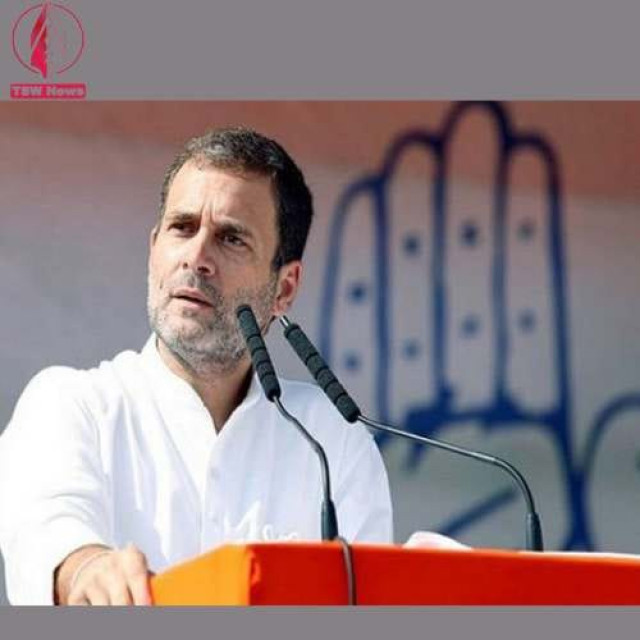

In a fiery speech during a discussion on the Union Budget, Congress leader Rahul Gandhi likened PM Narendra Modi and his government to the mythical Chakravyuh from the Mahabharata, trapping the country and its people in a web of monopoly, corruption, and political dominance. He slammed the budget and accused it of favoring big businesses and ignoring the plight of farmers, youth, and small businesses. Gandhi's scathing attack on the government received backlash from Speaker Om Birla, but he continued to criticize the internship program announced in the budget, calling it a mere band-aid on a broken system.
Chakravyuh: Rahul Gandhi's Metaphor for Modi Government's Policies
In a heated speech during the discussion on the Union Budget, Congress leader Rahul Gandhi launched a scathing attack on Prime Minister Narendra Modi and his government, likening them to the mythical Chakravyuh from the Mahabharata.
The Myth of Chakravyuh
In the epic Mahabharata, the Chakravyuh was an intricate military formation designed to trap and defeat enemies. It consisted of countless concentric circles, with each circle guarded by warriors. Once trapped within the Chakravyuh, it became virtually impossible to escape.
Gandhi's Allegory
Gandhi argued that Modi's government had created a similar "Chakravyuh" for India, trapping the country and its people in a web of monopoly, corruption, and political dominance. He claimed that the government's policies favored big businesses at the expense of farmers, youth, and small businesses.
Criticism of the Budget
Gandhi tore into the Union Budget, accusing it of ignoring the real needs of the country. He criticized the government's focus on privatization and foreign direct investment, claiming it would lead to the sell-out of national assets. He also slammed the internship program announced in the budget, calling it a "token gesture that was not enough to address the unemployment crisis.
Government Response
Gandhi's speech drew a sharp rebuke from Speaker Om Birla, who accused him of "playing politics" and "disrespecting the House." However, Gandhi remained undeterred, continuing to criticize the government's policies.
FAQs
Q1: What is the significance of the Chakravyuh metaphor? A1: The Chakravyuh represents the complex and seemingly impenetrable challenges faced by India under the Modi government.
Q2: What were Gandhi's main criticisms of the Union Budget? A2: Gandhi accused the budget of favoring big businesses, ignoring the plight of farmers and small businesses, and pursuing privatization and foreign direct investment at the expense of national interests.
Q3: How did the government respond to Gandhi's speech? A3: Speaker Om Birla criticized Gandhi for "playing politics," but Gandhi continued to attack the government's policies.
Q4: What is the internship program announced in the budget? A4: The internship program is a scheme to provide stipends to students interning in government agencies, with the aim of enhancing their skill development and employability.
Q5: What is the history of the Chakravyuh metaphor in Indian politics? A5: The Chakravyuh metaphor has been used in the past by other political leaders to criticize government policies, including Mahatma Gandhi who likened the British Raj to a "Chakravyuh" during the Indian independence movement.

The Pasighat police in East Siang district, Arunachal Pradesh have arrested the 33-year-old boys' hostel warden of Sanggo English School for sexually assaulting minor students. This came to light when a student was hospitalized for urogenital complications. The incident has sparked outrage from parents and the public, demanding strict action against the accused warden. In response, the Arunachal Pradesh State Human Rights Commission (APSHRC) has taken suo motu cognisance and ordered for a detailed report on the investigation, victim protection, and school management.

Actress Siddiqa Begum, daughter and legal heir of Shah Bano, has served a legal notice on the makers of the upcoming Bollywood film 'Haq'. The notice states that the film's unauthorized depiction of the personal life of Shah Bano without the consent of her legal heirs is a violation of their rights. 'Haq' is based on the landmark 1985 Supreme Court case that granted maintenance to Shah Bano, a Muslim woman, from her divorced husband.

After four years, the 'Darbar Move' tradition in Jammu and Kashmir has been restored, fulfilling the promise of the government and bringing a boost to the economy. National Conference chief Farooq Abdullah expressed happiness, noting that those who sought to separate Jammu and Srinagar have failed. Chief Minister Omar Abdullah received a warm reception and inspected the secretariat premises after the ceremony, as security in the region was heightened for the occasion.

Delhi Legislative Assembly Speaker Vijender Gupta praised Swami Dayanand Saraswati as not just a saint and reformer, but also a pivotal figure in India's freedom struggle. Speaking at the International Arya Samaj Conference, Gupta highlighted how Swami Dayanand's teachings sparked a revolution that led to the nation's independence. The event was attended by esteemed guests including Gujarat Governor Acharya Devvrat and top officials from the Arya Samaj community, all paying tribute to the enduring impact and legacy of Swami Dayanand Saraswati.

The Metro Railway Kolkata has announced a major schedule expansion for its Yellow Line, which runs between Noapara and Jai Hind Bimanbandar (Airport) in Kolkata. Starting from 3 November, weekday operations will increase to 120 services with extended operating hours, providing greater convenience and accessibility to commuters. Weekend travellers will also see a significant frequency upgrade, making travel on Saturdays and Sundays hassle-free. This move is expected to improve the overall public transportation system in the city and benefit the commuters.

Despite some reassurances that online verticals focused on diversity will continue, NBC News has announced a round of layoffs that will impact about 150 employees, or 2% of their workforce. The cuts are said to be a result of cost-cutting measures in preparation for the split of Comcast's cable networks into Versant. This move signifies a shift in priorities for NBC management, prioritizing corporate profits over hard-working members, according to Susan DeCarava, president of The NewsGuild of New York. This change also means that MSNBC will no longer lean on NBC News for newsgathering, with those ties expected to be severed next week.

The Kasibugga Venkateswara Temple in Srikakulam district was the site of a heart-wrenching stampede, causing multiple fatalities and affecting the community deeply. Chief Minister N. Chandrababu Naidu has expressed his sorrow over the unfortunate incident, as well as directing officials to ensure that those injured receive the best medical treatment possible. As local officials and public representatives are called to oversee relief operations, swift action is required to aid those affected and manage the situation effectively.

Indian Prime Minister Narendra Modi inaugurated the Shanti Shikhar Academy for Peaceful World in Raipur, praising the Brahma Kumaris organization for bridging India's ancient wisdom with the world's search for harmony. He credited the group's selfless service and spiritual discipline for their efforts towards universal peace. He positioned the Brahma Kumaris as protectors of India's soul and highlighted India's proactive role in addressing global crises such as disaster relief and environmental threats.

In an act of solidarity and protest, millions of Muslims in India used their Friday prayers to denounce the recent killings that took place in Pahalgam. The news comes amid growing tensions between the Muslim community and the Indian government. Many are viewing this as a sign of unity and determination from the Muslim population in India.

The state of Karnataka, or Kannada Rajyotsava, marked its 69th anniversary with a grand ceremony organized by the district administration in Mangaluru. District in-charge minister Dinesh Gundu Rao paid tribute to the leaders and writers who fought for a unified Kannada state and presented awards to 80 outstanding individuals and organizations. In his address, the minister highlighted the rich cultural and historical heritage of Karnataka and called for a sense of pride among its citizens.